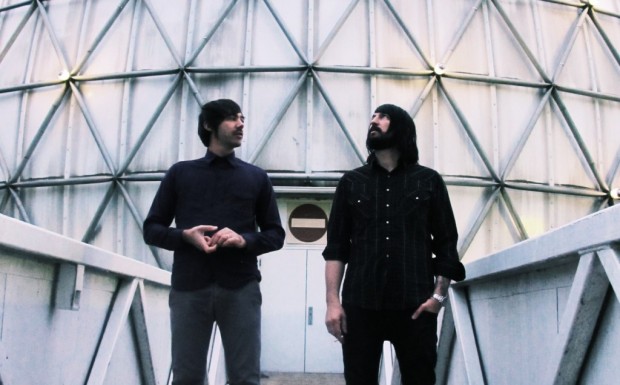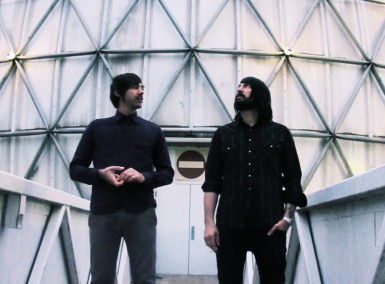 Ten years can be an eternity in the music industry. Remember 2004? We had George W. Bush, MySpace, Britney Spears and no hashtags, twerking teenagers or Putin invading other countries. In October of that year two young gentlemen from Toronto who named themselves DEATH FROM ABOVE 1979 released their debut album. Back then You’re A Woman, I’m A Machine gained some recognition and made these guys well-know characters in the indie music scene of the early 00s.
Ten years can be an eternity in the music industry. Remember 2004? We had George W. Bush, MySpace, Britney Spears and no hashtags, twerking teenagers or Putin invading other countries. In October of that year two young gentlemen from Toronto who named themselves DEATH FROM ABOVE 1979 released their debut album. Back then You’re A Woman, I’m A Machine gained some recognition and made these guys well-know characters in the indie music scene of the early 00s.
In some way the energetic garage rock of Jesse F. Keeler and Sebastien Grainger already marked a first step of bridging the power of a rock show with the pumping beats of a techno club. Only one year later they released a remix album featuring acts like JUSTICE and EROL ALKAN, long before anybody heard the terms ‘nu rave’ or ‘EDM.’ The band broke up in 2006, exhausted by their own success and later Keeler became a viral part of the hyped American electronic music scene as well while being 50 percent of producer duo MSTRKRFT.
It’s been a wild ride in the past year’s but not it looks like DEATH FROM ABOVE 1979 are back for good. Pretty much exactly ten years after the debut, their sophomore record The Physical World will be released on September the 9th. In the three years after their live comeback Grainger and Keeler perfected their renewed chemistry and shaped their comeback record in the way they wanted it to sound. NOTHING BUT HOPE AND PASSION had the chance for a quick phone call with a quite relaxed Jesse F. Keeler to talk about the past decade, the changes that happened and his despise for the whole ‘EDM’ scene.
Back in 2006 you broke up for multiple reasons. Creative differences might have been the most obvious ones. What made you two join forces again? Was it the wisdom of age?
(laughs) Well, we’ve been giving all sorts of excuses over the past years. The truth of the situation back then was that we didn’t really know what the point of the band was at that time. We hadn’t been able to properly work on music as we were mostly performing. We created music and then we went on tour and it just seemed to never really end. We wanted to do all kinds of things but there was no opportunity of doing them. That’s why the both of us turned off and neither of us wanted to do it anymore.
So, it was a feeling of exhaustion?
Yeah, that might be a good way of describing it. The toughest part is… you know, a big part of being in a band is creating music and not just playing music. We didn’t have any chance to do that, nobody gave us that chance. Even when we made our first record we’ve been called away multiple times to play even more shows. We never got to finish a whole bunch of songs. And that is not the reason the two of us originally started making music. You need to be creative outside the performance although there’s a certain amount of creativity involved in that as well.
Sounds like a tough time.
I remember us being on tour with quite bigger bands back then and I noticed they struggled as well with various things. So the two of us tried to figure out what bothered us and we decided to stop it once we noticed something like this happening in our lives. It actually happened to us recently again where we both were facing such a situation. And I told Sebastien: ‘Look, this is the kind of thing that ruined us in the past.’ He recognized it and we agreed to change something immediately.
Well, that does sound like wisdom of age to me.
I like it when you say that. (laughs)
Ten years is quite a time span. What are the main things that have changed for you in this time?
The most obvious thing is that when we had to deal with the music industry in 2004 the attitude towards us was quite different. When we went to a label back then it was basically just us fighting for us. I remember being in this one record label office and the guy who listened to the record and called us in said: ‘All your songs sound the same; I don’t know what I can do for you.’ And we were like: ‘Why the fuck did you call us in the first place?’ (laughs) Now it’s quite a contrast. When we decided to make this record we walked into this room in California early last year to meet with the label everyone was there. So, we entered the room and everybody applauded to us. Standing ovations and everything (laughs)
The return of the saviours…
It was hilarious. What really changed is… when we walk into this room it’s not just us, it’s also our fans. They’re standing behind us when we say: ‘Okay, this is our idea and we’re only doing it this way.’ And all those people who are dealing with us know that our fans are going to be there as well. I know the industry changed a lot but for us it is actually for the better.
In which way did your involvement in MSTRKRFT and the whole electronic music scene change the perspective on DEATH FROM ABOVE 1979? I mean, you clearly sense some references in a song like ‘Trainwreck 1979’.
Well, it’s still me so that’s where it’s coming from. There are certain ways of how I am doing music, certain chords and chord changes that are very much Jesse Keeler. I got a specific musical style so your recognition doesn’t surprise me.
Did the DFA revival also happened because you were a bit sick of the electronic music scene.
Not so much. For me, music is music. I don’t think that much in certain genres. A good melody is a good melody and great lyrics are great lyrics. I always loved electronic music and I always will. You know I had a residency back then in Toronto which I lost because I toured so much with the band. House and techno music are quite special to me. What really angered me about electronic music and especially the whole EDM-hype was that it totally lost its signature. Years ago I could clearly identify producers and styles. I could listen to a PAUL JOHNSON track and recognize his style without specifically knowing it was one of his songs. And these things became rare in the whole electronic music scene lately, especially in the EDM-scene.
Right… where does DEADMAU5 end and HARDWELL begin?
Exactly. It could be anyone. I mean, there’s a lot of money that can be made by creating music that sounds the same. When MSTRKRFT showed up it was something new. Same goes for other acts like BOYS NOIZE, JUSTICE or SIMIAN MOBILE DISCO. Everyone got their own style in the early days. But that changed quite quickly, especially when the whole thing exploded in America. And I needed to get away from it because I didn’t want to hate it. Sometimes you just know when things go into a bad direction but we’re still working on another MSTRKRFT record right now. Although it might sound a bit different.

I know you said that you pretty much don’t care about how ‘The Physical World’ will be accepted by the listeners. But seriously, was there no pressure at all?
The main thing is this: When we stopped being DEATH FROM ABOVE 1979 the band still existed in a certain way. The album was so rare and constantly made new fans. So even if weren’t involved, the band still existed in the people’s minds and it grew. Before we started making this record we played a lot of shows. And as we played our first shows we realized that everybody knew every word during the concert. They were so excited and I remember looking these people in the eyes and realizing they were so young. They had to be children when the first record came out. Still, they found the album and loved it for various reasons. We had this evidence that the band existed – even without us. Sebastien said that this is some sort of talisman for us. We can watch it all through these people’s eyes to understand why we’re doing this. Does this make sense? (laughs)
Yeah, I can see your point. It helped you and gave you confirmation instead of anxiety.
Indeed. It’s like the band became a third person. And that totally changes the way you approach a recording process. We just wanted to approve it by also not ruining it. Our goal was to expand the idea of the band, pushing the boundaries a bit more in every direction. We said: ‘Okay, when we go softer we go even softer. And when we go harder we go even harder.’
You reformed in 2011; the album arrives three years later. Did you need these three years of touring to get the record done in that way?
We really needed that time to make decisions for ourselves on how we want to approach the whole thing. We wanted to be sure of what we were doing. We needed time to think about what would make us really happy. I certainly didn’t want to rush into things.
One of your main goals is to become – like you said it – the ‘AC/DC of hardcore.’ What does that mean?
(laughs loud) Yes, but we still have work to do. What’s great about them is this feeling. I mean they have a certain sound but it’s much more than just that. I chase that feeling. When I start creating music I have a quite abstract idea of a feeling in my head and I’m trying to get to a more specific form of it. AC/DC are almost like a dance group. It’s much about riffs and lyrics – they are a magical group.
And these elements are quite important to you. I like the way of how you combine passion with an acceptable amount of anger in your music as well. I recently watched a documentary about Kurt Cobain and I found myself wandering: why is today’s rock music featuring so less honest anger in the way it is created. You know what I mean?
I see. I mean there’s a lot of emotional music made these days, very sad or very loving or even both. It’s fine but there are far more feelings that you can experience. What makes you listen to music is the way you connect with it on an emotional level. We make this music because we need a way to get these feelings out. Unfortunately not many acts are doing this today. Hate and anger are just as important as love. There’s no love and sadness without hate and anger. There’s so many bad shit happening that I can’t understand how you can have your head in the clouds. It’s more realistic to cover it all.
[youtube id=”wqBYHrw9_ys” width=”620″ height=”350″]
—



